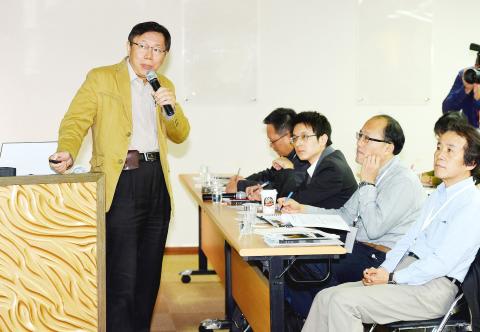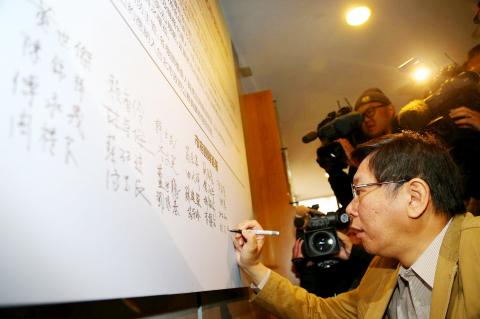Taipei mayor-elect Ko Wen-je (柯文哲) yesterday defended his city official appointment decisions amid accusations that he is breaking his promises of transparency and selection through collective decisionmaking, and insisted that he has played by the rules, saying that he is upset about the protests.
Since Ko’s election at the end of last month, his appointments of city officials — including directors for the departments of labor, cultural affairs, environmental protection and social affairs — have been followed by protests from selection committee members who have characterized the selection process as opaque and defective.
The latest protest came on Saturday, when the selection committee chair for the director of the department of cultural affairs, Chen Chi-nan (陳其南), published an open letter to Ko, saying that — while he trusted Ko — people around him might be trying to hide things from him. Chen hinted that director-to-be Ni Chong-hua (倪重華) might have “cheated” to get the appointment.

Photo: Lo Pei-der, Taipei Times
Chen wrote that Ni had arranged for “his people” to be on the committee, to make sure that he would become one of the three finalists from whom Ko and his close associates would choose the director.
“I do not know how to answer the question; isn’t he [Chen] the head of the selection committee?” Ko said when asked to comment on Chen’s accusations outside a training event for his incoming city government team in Taipei yesterday. “I would say that some good accomplishments would be the best answer to these questions.”
Ko said that he and his inner circle have chosen from the three finalists endorsed by the selection committee for the cultural affairs role, and that they were not informed of the scores that each candidate received in the committee vote. While professional capacity is a priority, whether a person would work well with others in the administrative team is also a key factor in selection, he added.

Photo: CNA
Ko appeared to take a harsher stance with the future city officials during the training session.
He said that, though some of the former selection committee members asked him to reconsider some appointments: “I am a very determined person, and since the appointments have been announced, I will not make any changes.”
“These past few days, I have been thinking that maybe I should call these very important people [who protested]. I have not done so yet, because I am upset,” Ko said. “I will think about it.”
Ko also reminded the officials-to-be that — to work as a team — everyone must be honest, so that they trust each other.
“Everyone has one chance to lie to me — and that is before I discover that you lie to me,” Ko said. “If I find out that you have lied to me, you are finished. I will never have you on my team again.”
He said that he would always make decisions supported by evidence.
“Do not tell me that you heard someone saying something. I hate that. If you want to convince me of something, show me the statistics and hard evidence,” Ko said.

CHAOS: Iranians took to the streets playing celebratory music after reports of Khamenei’s death on Saturday, while mourners also gathered in Tehran yesterday Iranian Supreme Leader Ayatollah Ali Khamenei was killed in a major attack on Iran launched by Israel and the US, throwing the future of the Islamic republic into doubt and raising the risk of regional instability. Iranian state television and the state-run IRNA news agency announced the 86-year-old’s death early yesterday. US President Donald Trump said it gave Iranians their “greatest chance” to “take back” their country. The announcements came after a joint US and Israeli aerial bombardment that targeted Iranian military and governmental sites. Trump said the “heavy and pinpoint bombing” would continue through the week or as long

TRUST: The KMT said it respected the US’ timing and considerations, and hoped it would continue to honor its commitments to helping Taiwan bolster its defenses and deterrence US President Donald Trump is delaying a multibillion-dollar arms sale to Taiwan to ensure his visit to Beijing is successful, a New York Times report said. The weapons sales package has stalled in the US Department of State, the report said, citing US officials it did not identify. The White House has told agencies not to push forward ahead of Trump’s meeting with Chinese President Xi Jinping (習近平), it said. The two last month held a phone call to discuss trade and geopolitical flashpoints ahead of the summit. Xi raised the Taiwan issue and urged the US to handle arms sales to

BIG SPENDERS: Foreign investors bought the most Taiwan equities since 2005, signaling confidence that an AI boom would continue to benefit chipmakers Taiwan Semiconductor Manufacturing Co’s (TSMC, 台積電) market capitalization swelled to US$2 trillion for the first time following a 4.25 percent rally in its American depositary receipts (ADR) overnight, putting the world’s biggest contract chipmaker sixth on the list of the world’s biggest companies by market capitalization, just behind Amazon.com Inc. The site CompaniesMarketcap.com ranked TSMC ahead of Saudi Aramco and Meta Platforms Inc. The Taiwanese company’s ADRs on Tuesday surged to US$385.75 on the New York Stock Exchange, as strong demand for artificial intelligence (AI) applications led to chip supply constraints and boost revenue growth to record-breaking levels. Each TSMC ADR represents

State-run CPC Corp, Taiwan (CPC, 台灣中油) yesterday said that it had confirmed on Saturday night with its liquefied natural gas (LNG) and crude oil suppliers that shipments are proceeding as scheduled and that domestic supplies remain unaffected. The CPC yesterday announced the gasoline and diesel prices will rise by NT$0.2 and NT$0.4 per liter, respectively, starting Monday, citing Middle East tensions and blizzards in the eastern United States. CPC also iterated it has been reducing the proportion of crude oil imports from the Middle East and diversifying its supply sources in the past few years in response to geopolitical risks, expanding